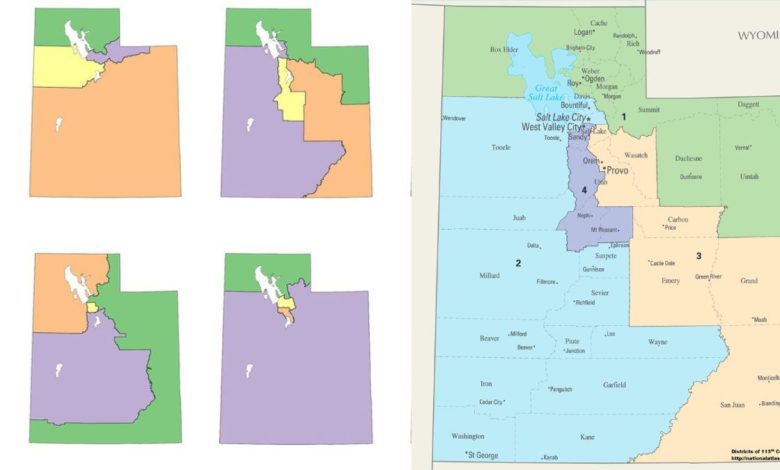
The Supreme Court’s overturning of Roe v. Wade on June 24 was immediately felt in Utah, where a “trigger law” banned abortion in the state right after the ruling. Lawsuits have paused the ban for now, but other upcoming Supreme Court decisions could have further impacts on the democratic rights of Utahns — specifically, their voting rights.
The Supreme Court is set to deliver a major ruling on Moore v. Harper in the summer of 2023. Moore v. Harper came from the state of North Carolina where North Carolinian officials are hoping the Supreme Court will reinstate gerrymandered congressional maps. This would uphold the “independent-state-legislature theory,” which in the most extreme, says that a state legislature could simply overturn federal election results decided by popular vote. Unelected delegates could then summarily appoint Republican politicians to legislative seats and ultimately change the landscape of federal election results.
In Utah, a similar case involving gerrymandering is in the courts, and attorneys for the state of Utah are hoping to delay a ruling in the case until the Supreme Court hears and rules on Moore v. Harper. In other words, the Utah legislature is hoping to limit what is supposed to be the most basic right of representative democracy — voting.
Utah’s future decided by reactionary right-wing politicians
In November 2021, Governor Spencer Cox confirmed a new congressional map for the state of Utah that will stand for the next ten years. The new map, adopted by the state legislature, ignored maps proposed by the Independent Redistricting Commission splitting Salt Lake County — the state’s most populous, non-LDS, and majority-leaning Democrat county — into four districts. These areas were instead lumped into districts where conservative-leaning constituents watered down the more progressive population, depriving this group of any political power that could oppose Republican control in the Utah state legislature.
Not only did this ignore partisan fairness and democratic participation, it completely eviscerated the strides made by a majority of Utahns who voted for Proposition 4, an anti-gerrymandering reform, in 2018.
Despite “hearing” proposals from people across the state of Utah on new districts, and receiving feedback on the state’s proposals, Governor Cox’s confirmed map looks strikingly similar to previous congressional maps that split Salt Lake City and connected it to more rural, right-wing areas in the state.
In March of this year, the League of Women Voters of Utah, Mormon Women for Ethical Government and several individual voters filed a lawsuit challenging the new congressional map and alleging the boundaries adopted by the Utah legislature and confirmed by the governor constituted illegal gerrymandering. Now, with Moore v. Harper set to be heard by Supreme Court, attorneys for the state of Utah are pushing to delay a ruling on the lawsuit until the SCOTUS ruling in the summer of 2023.
The end of Roe signals a new period
The overturning of Roe v. Wade when the majority of the population is for keeping abortion legal has shifted the landscape in the United States. Millions of working-class people now recognize that their supposedly guaranteed, fundamental civil rights are under attack by an unelected group of judges who are poised to favor the positions of the extreme right-wing.
The threats by the Supreme Court to overturn fundamental protections for LGBTQ people, to further take away the rights of millions of women to control their own bodies by targeting birth control, to turn back the clock on civil rights for Black and other nationally-oppressed peoples, to throw out even meager efforts to curb catastrophic climate change and to eradicate the ability of people to vote are now shockingly many.
Utah has become a proving ground for the right wing on these issues.
Since the ruling over Roe, Utah’s trigger law SB 174 was immediately put into effect and immediately banned abortion. Although the law is currently on hold due to the Planned Parenthood Association of Utah filing a preliminary injunction, another severely anti-abortion law is in its place until a decision is reached by the Utah Supreme Court.
During Utah’s 2022 General Legislative Session, anti-trans bill HB 11 passed, banning transgender girls from participating in K-12 scholastic sports.
The illegal gerrymandered congressional map drawn by Republican-controlled Utah state legislatures could remain in place if Moore v. Harper was ruled in their favor.
Utahns won’t go back
As it stands, the majority of working-class Utahns believe that abortion is a right that should be easily accessible by women and other people that need an abortion. Most Utahns also believe in the concept of democracy and the centrality of the right to vote.
Millions of people across the state will be adversely impacted by reactionary rulings both by state politicians and the Supreme Court. They must not be ignored. In the period after the overturn of Roe, it is vital to bring together a wide variety of people to defend basic rights. All progressive reforms won in state and federal governments have come from the organization of working-class people to push forward democratic rights, not by the will of ruling-class politicians.






